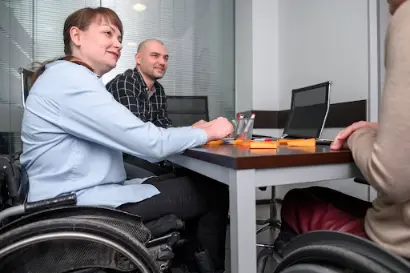The NDIS is another program by the Australian government to empower Australians with permanent and significant disabilities. It provides the funds necessary for services, therapies, and equipment to achieve goals and eventually move towards a life of independence. Unfortunately, it’s not everybody’s good fortune to be eligible for NDIS support, and their eligibility criteria can sometimes be confusing. This comprehensive eligibility guide will help you know everything necessary to take the steps you need to qualify, further guiding you through the process of filing for an NDIS plan and how to use your plan the best.
What is the NDIS?
However, it would be great to know how the NDIS is structured and how the system is conducted. The NDIS stands for people under 65 in Australia who cannot attain support that helps them achieve their goals. Such might include supporting daily living activities, funding therapy sessions, or providing necessary equipment. NDIS funding does not work like traditional welfare programs. They are person-oriented, meaning everyone has needs addressed, and one can receive the care or service needed.
The scheme provides financial support for individuals with disabilities to cover medical requirements, educational costs, accommodation, and employment expenses. NDIS participants will get access to registered NDIS providers’ services, such as physiotherapists, occupational therapists, speech pathologists, etc. NDIS is a customized, flexible package to promote and enrich the lives of Australians with disabilities.
NDIS Eligibility Guide
After gaining a general understanding of the NDIS program’s offerings, the next step is to determine whether one really qualifies to be part of the scheme. The eligibility criteria for membership in the NDIS are derived from the criteria outlined below.
The key points have been simplified as an NDIS Eligibility Checklist, so you will know better:
- Age Requirement You must be between 7 and 65 years of age to apply for NDIS support. Less than 7 years old? You can be eligible to access ECEI. Over 65 years old? You can be eligible to access services through CHSP or Melbourne True Care. However, if you have started NDIS services and the patient is over 65 years old. Meanwhile, the plan is still in effect; you can continue availing services under the NDIS if the patient fulfills all the eligibility criteria.
- Australian Residency To be eligible for NDIS funding, you must be an Australian citizen or permanent resident or hold a Protected Special Category Visa. The Money allocated by the NDIS is only available to those registered as non-lawful residents of Australia. So, if you fall into the above mentioned ones, it’s a big no-no.
- Disability Type The most relevant condition to make a person eligible for NDIS is the fact that you have a permanent and significant disability. Disabilities refer to physical, intellectual, sensory, and psychosocial disabilities that significantly impair the ability to participate in activities that reflect everyday life. Disabilities can just as quickly cause impairments in mobility as conditions like autism spectrum disorder, cerebral palsy, or multiple sclerosis.
- Impact on Daily Life You would considerably impact your living dimensions-communications, mobility, social interaction, learning, and self-care. NDIS will assess how much it may still affect your independence and capability to perform daily activities. As such, you may qualify for funding if your condition most likely requires full-time support; therefore, you cannot live independently.
- Requirement for Long-Term Support It is available only for those people who will have lifelong disabilities. Or maybe a temporary or curable condition will render one ineligible. The kind of disability that persists for years, decades, and even a lifetime is what the NDIS was designed for. All the support is needed to live as independently as possible for their entire lifetime.
- Evidence of Disability Medical diagnosis documentation will enable you to provide evidence in your application and indicate how the disability affects your life. These include medical reports, professionals/ specialists, and allied health professionals, including physiotherapists, Occupational therapists, Psychologists, and more. You will need to enable the preparation of assessments and other supporting documents.
NDIS Eligibility Checklist: A Step-by-Step Guide
You will be given a checklist, as shown below, to assist you in identifying if you meet the eligibility requirements for NDIS support:
- Age: Age should be between 7 and 65 years?
- Residency: Are you an Australian citizen, permanent resident, or a Protected Special Category Visa holder?
- Type of Disability: Do you have any permanent disability that seriously affects your daily activities?
- Impact of Life: Has the disability involved imposing a significant effect on social inclusion, mobility, communication, or self-care?
- Lifetime Support: Do you require lifetime support or care because of disability?
- Medical proof: Is such a condition proven to exist?
Do you meet these conditions, and are you eligible for NDIS? Then apply for NDIS
How to Apply for NDIS

When you are satisfied that you qualify for the application, it is time to apply. Here is a simplified step-by-step guide:
- Contact the NDIS The initial step is to call the NDIS contact center or online application. Alternatively, you can refer to a Melbourne LAC or NDIS provider.
- Prepare the Necessary Documents Collect some eligibility supporting documents and collate medical reports and assessments by treating practitioners, as well as some other evidence of identity, such as residency status.
- Complete the Application Once you have the documents ready, obtain the form. The NDIS should be aware of the facts about your disability and how it impacts your regular daily activities because of it, and what sort of support you may require, too. The better you can honestly and accurately answer this, the more likely the NDIS is to be able to deliver the proper support needs.
- Assessment and Plan Development You don’t have to wait around after you apply. Once you lodge your application, the NDIS will work out your eligibility, and then they’ll make a plan for a successful application. That is, you would sit down with an NDIS planner or coordinator going through what you would like to achieve, what support you would require to get there, and what funding you should receive for the support and services you need.
- Review and Access Support You may also use your completed NDIS plan to access services. You can get the services outlined in that plan. In other words, for instance, you can choose who among the providers you would like to use your NDIS for and work with them to gain therapy, equipment, personal care, or modifications to your home.
NDIS Plan Management
After getting permission, you can implement your plan as you wish, taking up any form that falls within the stipulated choices. You can implement your plan directly or hire a third party to administer it in the manner allowed under the NDIS Plan Management or agency management, which you may select.
- Self-management: This management is owned and managed by the individual. It manages NDIS funding and payments and, to this extent, has given one the most flexibility, as one may use any provider not registered under NDIS for the services offered and thus conduct all financial transactions on the account.
- Plan Management: If you want to be sure of the Money, you can hire a third-party plan manager to manage your budget and pay. You’ll still be in charge of your goals and services.
- Agency Management: Your likely standard option will be direct funding straight from NDIS management. This has a limit because you can’t use it in collaboration with any provider registered with the NDIS, but it takes care of all your financial transactions.
They all have pros and cons, so you will likely need to decide which circumstances apply to you.
Conclusion:
Navigating the NDIS eligibility criteria is rather overwhelming, yet learning about it and its application may be some of the most important first steps. This NDIS eligibility guide will very well be an important document that clearly identifies basic requirements, provides a checklist for assessing eligibility, and clearly explains how to apply for NDIS support.
Then, you will present the necessary documents and apply, and then work with an NDIS planner to help you build a plan that best suits your needs for achieving your goals. Whether you manage or have a plan manager, the NDIS provides access to most services and funding options for improving your lifestyle.
If you live in Melbourne, you should have more than enough experienced providers guiding you through the process. Seek advice from getting an NDIS provider in Melbourne, and here’s the best news: in short, the NDIS is there for your empowerment through independent living and ensuring that your goals come into being. So take that step today towards that brighter future.




No comment yet, add your voice below!